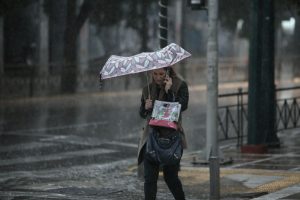Israel’s government authorized a retaliatory strike against Hezbollah in Lebanon, amid an American-led diplomatic push to contain the fallout from a strike that killed 12 young people in the Israel-controlled Golan Heights.
Israel and the U.S. have accused the Iran-backed militia Hezbollah of carrying out Saturday’s strike. Israel’s security cabinet held an hourslong meeting Sunday and empowered Prime Minister Benjamin Netanyahu , just back from his visit to Washington , and his defense minister to decide on the character and time of retaliation against Hezbollah. The Israeli military already struck several targets deep in Lebanon on Sunday morning in response to the attack.
As many in Lebanon braced for an Israeli strike, Lebanon’s Middle East Airlines delayed the return of some of its flights Sunday evening.
Hezbollah, a U.S.-designated terrorist group that controls southern Lebanon, said it had nothing to do with the deaths but claimed responsibility for other attacks in the area on Saturday, including launching a Falaq-1 rocket at an Israeli military site a few miles from the strike scene. Israel’s military said that an Iranian-made Falaq-1 hit a soccer field in Majdal Shams, a community of the Druze religious minority, and that it was launched from the vicinity of Chebaa, a southern Lebanese village.
U.S. officials have reached out to their counterparts in Israel and Lebanon and traded messages with Iran to try to de-escalate the situation, said Arab and European officials familiar with the matter. All sides have indicated they aren’t interested in widening the conflict, but chances of a miscalculation remain high.
The White House National Security Council said Sunday that U.S. “support for Israel’s security is ironclad and unwavering against all Iran-backed threats, including Hezbollah.” Secretary of State Antony Blinken said Sunday that it was important to prevent the situation from escalating.
“We’re in conversations with the government of Israel. And again I emphasize its right to defend its citizens and our determination to make sure that they’re able to do that,” Blinken said in Tokyo. “But we also don’t want to see the conflict escalate. We don’t want to see it spread.”
In Majdal Shams Sunday, the community began burying the dead, who ranged in age from 10 to 20 years old, while survivors fought for their lives in hospitals. The strike injured around 40 people, the Israeli prime minister’s office said. The rocket carried a 50-kilogram, or about 110-pound, warhead, an unusually heavy payload, Israel’s military said.
“We are approaching the moment of an all-out war against Hezbollah and Lebanon,” Israeli Foreign Minister Israel Katz said shortly after Saturday’s strike. The attack “crossed all red lines, and the response will be in accordance.”
The Israeli military said the strike on Saturday was the single largest civilian casualty event in Israel since Oct. 7, when Hamas killed 1,200 people in the south of the country and took 250 people hostage, according to Israeli authorities. The attack triggered Israel’s continuing war in Gaza, where health authorities say 39,000 people have been killed, most of them civilians. The figure doesn’t specify how many of those killed were combatants.
The strike comes at a critical time for U.S.-led efforts to secure a cease-fire deal in Gaza. An escalation between Israel and Hezbollah could disrupt those negotiations, which have been stalled for months but resumed Sunday in Rome. Top officials attended the latest round of talks, including CIA Director William Burns , Israeli spy chief David Barnea , Egyptian intelligence chief Abbas Kamel and Qatari Prime Minister Mohammed bin Abdulrahman al-Thani , people familiar with the matter said.
Israel and Hezbollah have been exchanging cross-border fire since the Hamas-led assault on Oct. 7. Hezbollah has said it wouldn’t agree to a cease-fire until fighting ends in Gaza. Until now, Israel and Hezbollah had managed to keep the conflict within limits, but Saturday’s strike was the kind of incident that could escalate the fighting into war.
“We’ve always said that something like this is possible, that there is an attack that kills civilians for instance or in other ways creates a situation on one side that this party feels compelled to strike back very hard,” said Heiko Wimmen, project director for Lebanon, Syria and Iraq at the International Crisis Group.
“We’re going to get a higher level of violence, and that means almost by definition the risk of something like that happening again, that the risk of escalation increases,” he said.
Any full-blown war between Israel and Hezbollah could cause widespread death and destruction in both countries. During their last war in 2006, Israel bombed Beirut’s civilian airport and other infrastructure, and Israeli Defense Minister Yoav Gallant said in June that Israel was capable of bombing Lebanon “back to the stone age.”
On Sunday, Gallant’s office said the defense minister had ordered Israeli troops on the northern border to be at full readiness for any possible development. Hezbollah officials said the group expects Israel to target some of its senior leaders in retaliation but is unlikely to launch a full-scale war.
Hezbollah for its part has bulked up its military capabilities in recent years with the help of Iran, acquiring advanced missiles, drones and guidance systems. The group’s leader, Hassan Nasrallah , has claimed that Hezbollah’s precision missiles are capable of striking anywhere in Israel.
Hezbollah is Iran’s most important asset in the Persian Gulf state’s regional array of militant-group allies. Iranian security advisers have said an Israeli attempt to destroy Hezbollah, especially by launching a land invasion, would be the red line that could bring a direct Iranian intervention into the conflict. Iran has carried out a direct strike against Israel only once , a barrage of more than 300 missiles and drones in April.
Mojtaba Amani, Iran’s ambassador to Beirut, wrote on X that Iran doesn’t want the conflict to spread, while Iran’s foreign ministry warned against any Israeli response that “could prepare ground for expansion of instability, insecurity and flames of war in the region.”
A spokesman for Iran’s United Nations mission said diplomatic messages from the U.S. urged restraint from Tehran’s network of militias. “Iran’s response has been that this is a two-way equation,” the spokesman said.
The scene of the strike, Majdal Shams, is close to both Lebanon and Syria and is home to the Arabic-speaking Druze. First responders described a scene of carnage, and images showed dismembered bodies. The strike was among about 40 projectiles that the Israeli military said were fired from Lebanon into Israel on Saturday afternoon.
Some of the most critically injured teenagers and children were flown to a hospital in the northern Israeli city of Haifa. Three remain in a coma following emergency multisystem surgery, a result of shrapnel ricocheting through their heads, chests, and limbs, doctors said. Family members crowded outside the hospital’s pediatric intensive care unit, piles of untouched food spread for them on a table nearby.
Israel seized the Golan Heights from Syria during the Six-Day War in 1967, and then annexed the territory in 1981 despite international condemnation. Druze communities there have continued to retain their connection to Syria, and most don’t have Israeli citizenship. Syria’s recent civil war disrupted those ties and has led to an uptick of Druze from the Golan Heights seeking Israeli citizenship.
Write to Summer Said at summer.said@wsj.com and Jared Malsin at jared.malsin@wsj.com


